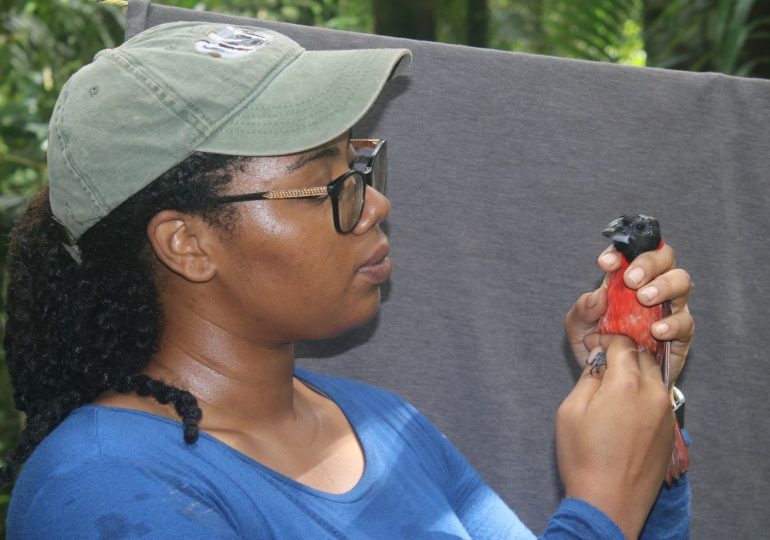Hi there! My name is Arianne-Elise Harris and I’m an instructor in the Department of Biology at the University of Guyana. My interests lie in population ecology where I’ve spent the last four years studying birds and mammals in tropical rainforests.
My interests in population ecology grew with an already established interest in the natural world. I’ve never been the type of person that could dedicate my life to one species, so I decided ‘Okay, I’ll study all of them!” This was not realistic. However, finding a middle ground in population ecology was a great alternative and I’ve loved it ever since! The most exciting thing about my field is seeing how the numbers change, how species fluctuate and how important it is to monitor that fluctuation. It’s a humbling feeling knowing how one seemingly small change can cause such a large ripple in a population for years. When it comes to the specifics of my research, I study low-impact logged forests in Guyana. I’d say the biggest ecology challenge I’ve faced thus far is finding an economically viable way to understand the underbelly of bird and mammal population change in Guyana’s rainforests. Guyana’s terrain is not the easiest to work in (though it is beautiful!), so that can make more detailed research work difficult to push through. I’d particularly love to see more research coming out of Guyana (my home country) tackling the more complex ecological questions. Guyana is in such a crucial transformation phase that it is important we do not leave our forests and its wildlife behind – especially in the socio-economic areas. Additionally, I’d say the biggest challenge I’ve faced in my career overall is myself. Imposter syndrome is not new to anyone who has been (or currently is) an early-to-mid career scientist and this self-doubt can inhibit you from pursuing grants, conferences and the like! I’m better at managing this now and with the help of a valued support system, I hope to pursue future research directions in functional and behavioural adaptations linked to extinction probabilities of birds and bats in low impact logged rainforests (just to name a few, haha).
I’m looking forward to serving as an Associate Editor with Functional Ecology because science communication is a skill I consider important as a researcher and academic. Science is about connecting people to our changing world and one of the key benefits of this position is learning how best to do this. Some challenges I may face include the difference in time zones since Functional Ecology works with persons all around the world, but technology will help in making this a bit easier! In this role, I’m looking forward to developing my skills as an educator and communicator and also keeping up-to-date with the latest ecology research. I’ll be looking out for writing for the “science bubble” – heavy jargon, over-saturation of terms and complex methodologies, which I commonly see. I have done this too and thus I believe the best way to address it is by editing with a wider audience in mind, not just the bubble.
My impression of Functional Ecology’s impact is one shared by academic colleagues and friends – the journal’s reach is impressive and its publications have the potential to reach the virtual mailboxes and ears of both academic and policy makers alike. This is not an easy thing to do, and I’m honoured to be part of helping the journal make that reach. I personally think that ecology is lacking not in awareness, but in resource investment and support for less privileged researchers in areas such as the Global South. At this critical point in Earth’s history, humans have the capacity to do right by our planet… The biggest challenge here is building the trust and wider interest to see it through and it all comes back to how we communicate it.
My piece of advice to early career researchers/ prospective authors in ecology is to never forget the humanity behind the work that you do. With every p-value or credibility interval, there is a person that trusts the narrative you type and the conclusions you make. I don’t think I’d change anything about the field of ecology. This field teaches you that you need to try, fail and try again because that’s how nature works, so that is how we shall work too.
Leave a comment




